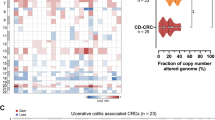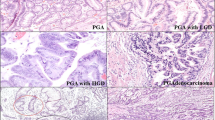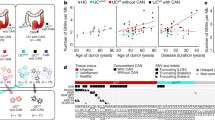Abstract
FHIT (fragile histidine triad gene), a candidate tumor suppressor gene, was recently identified and cloned at chromosome 3p14.2. Alterations of this gene have been reported in a number of primary human tumors, including colorectal, esophageal, gastric and lung carcinomas. However, some reports have found no abnormalities in this gene. We investigated a total of 63 primary esophageal tumors, nine esophageal cancer cell lines and 17 ulcerative colitis-associated neoplasms (UCANs) for alterations of FHIT. In 13 esophageal tumors, we employed overlapping reverse transcriptase-PCRs (RT – PCRs) to amplify and sequence the complete open reading frame of FHIT. One of 13 primary esophageal tumors analysed by RT – PCR expressed no detectable FHIT transcript; the remaining 12 expressed normal-sized transcripts with wild-type open reading frame sequences. In an additional 50 esophageal tumors, the polymorphic microsatellite loci D3S1300 and D3S1313 were used to evaluate loss of heterozygosity (LOH) at 3p14.2. Eleven of these 50 tumors showed LOH at one or both loci. In all these 11 tumors, genomic PCR and direct sequencing of FHIT exons 5 – 9 was performed. This analysis revealed that none of these 11 primary esophageal tumors contained any alterations in the FHIT open reading frame or adjacent intron sequences. Finally, among 17 UCANs, the in vitro synthesized protein (IVSP) assay detected no truncated protein products, nor were there any abnormalities in size or DNA sequence of FHIT RT – PCR products. However, in six of nine esophageal carcinoma cell lines, no FHIT RT-PCR product was detectable using either of the overlapping primer sets. Genomic PCR and direct sequencing of exons 5 – 9, also performed in these nine cell lines, revealed wild-type sequence in eight cell lines; however, one cell line contained no exon 5 PCR product. This cell line also lacked detectable FHIT transcript. These data suggest that the open reading frame of FHIT is not important in the development or progression of most primary esophageal carcinomas or UCANs, although lack of expression of the FHIT transcript may be common in esophageal cancer-derived cell lines. The possibility of an additional tumor suppressor gene at chromosome 3p14.2 remains to be evaluated.
This is a preview of subscription content, access via your institution
Access options
Subscribe to this journal
Receive 50 print issues and online access
$259.00 per year
only $5.18 per issue
Buy this article
- Purchase on Springer Link
- Instant access to full article PDF
Prices may be subject to local taxes which are calculated during checkout
Similar content being viewed by others
Author information
Authors and Affiliations
Rights and permissions
About this article
Cite this article
Zou, TT., Lei, J., Shi, YQ. et al. FHIT gene alterations in esophageal cancer and ulcerative colitis (UC). Oncogene 15, 101–105 (1997). https://doi.org/10.1038/sj.onc.1201169
Received:
Revised:
Accepted:
Issue Date:
DOI: https://doi.org/10.1038/sj.onc.1201169
Keywords
This article is cited by
-
The molecular genetics of cervical carcinoma
British Journal of Cancer (1999)



